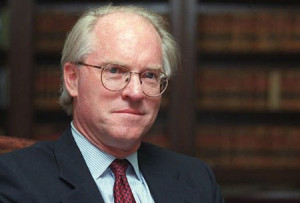 LOUISVILLE, Ky. – A federal judge appointed by former president George W. Bush rejected Kentucky’s ban on ‘same-sex marriage,’ declaring that the U.S. Constitution is the final authority on marriage, not its author, God.
LOUISVILLE, Ky. – A federal judge appointed by former president George W. Bush rejected Kentucky’s ban on ‘same-sex marriage,’ declaring that the U.S. Constitution is the final authority on marriage, not its author, God.
U.S. District Judge John G. Heyburn II ruled Tuesday against Kentucky’s constitutional amendment that sought to protect marriage as being between one man and one woman and banned so-called marriage between members of the same-sex.
The preamble of Kentucky’s state constitution written in 1891 states, “We, the people of the Commonwealth of Kentucky are grateful to Almighty God for the civil, political and religious liberties we enjoy, and invoking the continuance of these blessings, do ordain and establish this Constitution.”
Voters in 2004 passed a referendum to protect the biblical definition of marriage within the state.
“Only a marriage between one man and one woman shall be valid or recognized as a marriage in Kentucky. A legal status identical or substantially similar to that of marriage for unmarried individuals shall not be valid or recognized,” reads Kentucky Constitutional Amendment 1 of 2004, which was overwhelming approved by 75% of voters.
In his decision, Heyburn took a shot at those who hold to the historical and biblical belief that marriage comes from and is defined by God and those who voted for the amendment, expressing that such beliefs do not rise above the equal protection clause of the U.S. Constitution.
“In America, even sincere and long-held religious beliefs do not trump the constitutional rights of those who happen to have been out-voted,” Heyburn declared in his ruling.
Heyburn also criticized Kentucky Gov. Steve Beshear (D) for arguing that the ban preserves the state’s birth rate, and therefore contributes to the economic stability of Kentucky.
“These arguments are not those of serious people,” Heyburn concluded.
Earlier this year, Heyburn ruled that Kentucky must recognize so-called “gay marriages” performed in other states.
Heyburn has stayed his ruling pending an appeal to the U.S. Court of Appeals for the 6th Circuit.
Kentucky has a long history of acknowledging God.
In March of 2002, the Kentucky Legislature enacted a law declaring, “The safety and security of the Commonwealth cannot be achieved apart from reliance upon Almighty God,” which later was amended in 2006 to require the Executive Director of the Kentucky Office of Homeland Security to “[p]ublicize the findings of the General Assembly stressing the dependence on Almighty God as being vital to the security of the Commonwealth” by including its provisions in its “training and educational materials,” and by “prominently displaying a permanent plaque at the entrance to the state’s Emergency Operations Center,” stating the text.
In February of 2011, a Kentucky Court of Appeals upheld the law in a 2-to-1 decision, and further appeals by a group of self-styled atheists were unsuccessful in attempting to overturn the mandate.
Become a Christian News Network Supporter...


